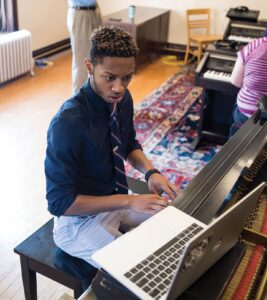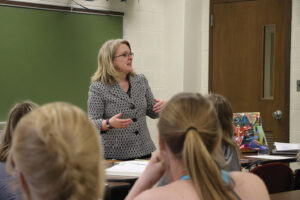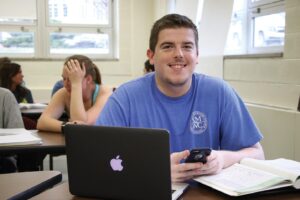
By Dianne Frances D. Powell
After only a semester at Saint Mary-of-the-Woods College (SMWC), Austin Sievers, a transfer student, feels he is well on his way to becoming fully-equipped for a career in a demanding, digital world.
Now in his second semester, he sums up his SMWC experience with these words: “Oh, I love it.”
“I’ve learned more in the two semesters I’ve been at The Woods than I have probably throughout my whole education career,” he continued. He values SMWC’s emphasis on critical thinking and hands-on learning. “One of the things I love about The Woods is it really challenges you to go out of your comfort zone,” he said.
The Vincennes native chose to transfer to SMWC because of its nationally-ranked marketing degree housed in the Department of Business and Leadership. It didn’t disappoint. In fact, in reflecting about a particularly beneficial class, Sievers and his classmates point to BU 353 Digital Marketing Essentials.
This class — taught for the first time in the campus program last fall— is a great example of how SMWC is preparing students for the data economy. It was a class that covered the stuff a 21st century marketer needs to know: how to execute digital marketing campaigns, determining target audiences, how to create a strategy for different digital/social media platforms, and of course, the foundations of digital marketing and its rapid growth. It was a class that included an online simulation that gave students hands-on experience in developing, monitoring and modifying digital campaigns. It was a class that required students to complete the Google AdWords certification, a professional accreditation from Google, which is quite a resume boost.
But this class wasn’t about just learning emerging technology. The professor, Meredith Williams, assistant professor of business, aimed to teach students how to think about a problem and how to apply their knowledge. “I want them to be able to think critically and discover the answers for themselves based on where the data leads them and not be confined by the platform or the technology,” Williams said. “This ensures that they will be prepared to solve problems in the workplace and improve digital performance no matter how much the technology itself may change.”
Although still nurtured by beautiful, historic buildings, the learning that happens within the SMWC classroom — delivered by knowledgeable professors — has certainly moved with the times.

Hands-on learning is a key part of an SMWC education. This method, which drives authentic understanding of course material, can be found in all academic departments at SMWC. In equine studies, for example, one course has enabled students to use a simulator to evaluate horse legs. Another gave them the opportunity to construct a high traffic pad at the horse barn.
In professional writing, students helped local daycares write grant applications one year and found themselves writing a community website the next. When interviewed for the website project, Bill Riley, assistant professor of English, said he wanted his students to gain knowledge and confidence to write for the web, an emerging writing field, as well as help them build clips for jobs and internships.
In the education department, faculty members Melanie Beaver and Maria Sellers host a Twitter chat session in class allowing future educators to learn how to use social media as an educational and professional development tool. During the session, they also interact with major players in the educational tech industry.
Inside the Conservatory of Music, technology has been placed directly in the students’ hands when SMWC launched the laptop program last fall. Equipped with the latest software in music, this has made it possible for music students to do coursework anywhere. Technology has become an important part in the study of music.
“Music and technology have always interacted in important ways, whether we look at inventions like the printing press, the piano, the phonograph, or, more recently, digital recording and personal computers,” said John McIntyre, professor of music. “We are convinced that today’s musicians, whether they are music therapists, performers, teachers, composers, or something else, will need to be proficient in using technology to support and extend their abilities.”
This spring, the transition of the Master of Leadership Development program into a fully online model has opened possibilities for more innovation.
“As part of our training for the fully online MLD cohort, some faculty members have been learning about a number of collaboration tools that can help us connect with our online students in new ways,” said Sherry Schnake, Ph.D., a professor in the program.

“One such tool is the virtual classroom that allows us to hold synchronous sessions with our students. Everyone can have their webcam on, so it allows us to feel more of a personal connection. We’re also learning how to make video assignments for students to easily upload videos they record.”
Schnake, professor of psychology who also teaches in SMWC’s Woods Online program says her online classes are designed to help students understand the material and apply it to real-world situations.
“One thing that I do in my online classes is to design the assignments so that students are asked to relate the material to their own examples and life experiences,” she said. “Any time students can connect the material to their own experiences, it makes for deeper learning and a more rewarding learning experience for students and faculty members.”
“Students also find and post online videos that relate to the week’s material, and discuss those videos with one another.”
These efforts by SMWC faculty all aim to help students succeed in life and in the workplace, which is the promise of an SMWC education. Faculty and staff have been working hand-in-hand to continue to fulfill this promise.
Career Center Director Susan Gresham ’79 said efforts are ongoing to embed career readiness into SMWC’s curriculum. Activities that help students prepare for the job market have been added as requirements in several courses. For example, mock interviews and resume development have been embedded in general studies courses and major-specific courses. In some Woods Online courses, a software is utilized to conduct recorded mock interviews.
